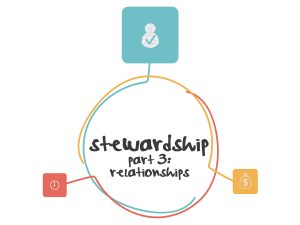 There are 2350 verses on finances in the Bible, and 15% of all the recorded words of Jesus were on money. Finances are obviously an important topic in the Word of God, and stewarding our finances well is vital to our Christian walk.
There are 2350 verses on finances in the Bible, and 15% of all the recorded words of Jesus were on money. Finances are obviously an important topic in the Word of God, and stewarding our finances well is vital to our Christian walk.
The foundation of everything relating to a discussion on finances is that God owns everything. He is the creator and sustainer of all things (see Psalm 24:1). Everything we have comes from God, we are not owners of it, we are stewards of God’s wealth. That is such an important paradigm shift we need to make in our lives.
The second reality is that we cannot take any of our material possessions with us into eternity. When we die, all our accumulation of wealth stays behind and gets divided up according to our estate. This sounds obvious, but so few live according to this reality. The Bible clearly states that what we do with our time and resources here on earth will store up for us riches in heaven. In a currency that we know nothing about.
We use the term tithe or tithing when we talk about giving money to the Lord’s work. This is not simply a modern Church word, rather tithing has been a part of many different cultures and religions throughout history. And in fact it pre-dates the law of Moses. A tithe is ten percent of one’s earnings or crops, set aside and given to God. In the OT book of the Prophet Malachi, we read how God rebukes the nation of Israel for their lack of tithing (see Malachi 3:6-12). You may argue that Malachi is in the Old Testament and it doesn’t apply to us today, we are under the new covenant and we are under grace. It is true that Jesus ushered in the New Covenant by his death and resurrection, but he also said in Matthew 5:17 that he did not come to abolish the Law, but rather to fulfill the Law.
People who view tithing as simply an Old Testament law whereby one is paying a debt back to God, miss the point entirely. The early church in the book of Acts understood this and were an extremely generous people. Tithing was never meant to pay a debt to God, in the Old or the New Testament, rather tithing builds our relationship with our Heavenly Father. Notice verse 10 of Malachi 3; “Test me in this,” says the Lord Almighty….” God challenges the people to test him, this is the only time in the Bible where testing God is seen as a positive action. God encourages us to test our faith in the giving process.
When one gives a tithe to the local church it is never simply to meet a church budget. Rather, you are tithing to the ministry of reaching the lost, sharing the Gospel and bring the light of Jesus to our community. Not simply meeting a budget, who wants to give to that? No as we seek to diligently steward the gifts and tithes, we seek to make an eternal difference for the kingdom of God. Eternal souls are at stake. Give to that.
Looking at one of the lessons Jesus taught on money we read of the rich young man in Mark 10:17-25.
Notice the posture of this man as he runs up to Jesus and falls down, begging Jesus for an answer. There is a desperation. He knows that there must be more to this life and he wants to have eternal security. But notice the question he asks; “what must I do to inherit eternal life?”. This man is looking for a set of rules, a checkbox that he can tick off to say that his eternal salvation is secure.
Jesus knowing his heart lists some of the ten commandments, to which the man responds that he has kept these laws since he was a boy. But notice the commandments that Jesus mentions. Jesus only focuses on the Commandments that relate to our relationship with our fellow man. Jesus saw deep into the heart of this man and saw that he was trying to follow a set of rules rather than seeking a relationship with God.
This is a trap we so easily fall into, we want a set of rules, but God wants a relationship and then out of that relationship we seek to do the will of God. Again it is reinforced that we cannot possibly earn our way into heaven.
Jesus looks at the man and the Bible says, “he loved him”, and then Jesus raised the bar and told him to sell everything he had and give it to the poor and then come and follow him. Jesus loved him, but let him go, because Jesus knew that he loved his money more than he loved God. His money was his idol. It doesn’t mean that all of us are required to sell everything we have. But if we hold on to our money as our security, as our peace rather than Jesus, it has become an idol and we need to rearrange our priorities.
Again, the kingdom of God is not about a set of rules, it is about a relationship with our Heavenly Father.
We don’t give in order to get something from God, even though there is tremendous blessing in a life of disciplined tithing, no we give because he first gave everything for us.
So Jesus raised the bar and made it clear that our response to the Gospel is much more than 10% of our income or following a set of rules. This man lost everything because of his wealth. His wealth robbed him of the greatest wealth of all, eternal life. Today people are still being robbed by wealth, by letting their finances become and idol and it is preventing them from a relationship with the provider of all wealth.
The truth is that God doesn’t need your money, He wants your heart.
God wants you and I to understand that a closed hand is unable to receive his blessing, but a generous hand is open to receive from God.
The challenge for us as followers of Jesus is not if we should be giving 10% of our income, the real challenge is what about the other 90%?
One may argue that after tithing 10% the rest of the money is yours to use as you wish. But is that really true?
As we look at our spending habits, how much of the 90% do we waste? You may not be wasting money on lottery tickets or cigarettes, but what about things like cable TV or high interest rates on debt.
This is vital for us as Christians, we need to do everything we can to get out and stay out of debt.
Live according to a budget. Living according to and within a strict budget is the very definition of what it means to be a good steward.
When we meet people who have a close walk with God and those who have strong faith in God, if you dig a little and find out their story, you will discover that 95% of their faith lessons were lessons on finances.
If you want to grow your faith, it starts with realizing that everything we have belongs to our Father in heaven, and then trust him for the future.




 Psalm 119 v9-16
Psalm 119 v9-16

 There are 2350 verses on finances in the Bible, and 15% of all the recorded words of Jesus were on money. Finances are obviously an important topic in the Word of God, and stewarding our finances well is vital to our Christian walk.
There are 2350 verses on finances in the Bible, and 15% of all the recorded words of Jesus were on money. Finances are obviously an important topic in the Word of God, and stewarding our finances well is vital to our Christian walk.